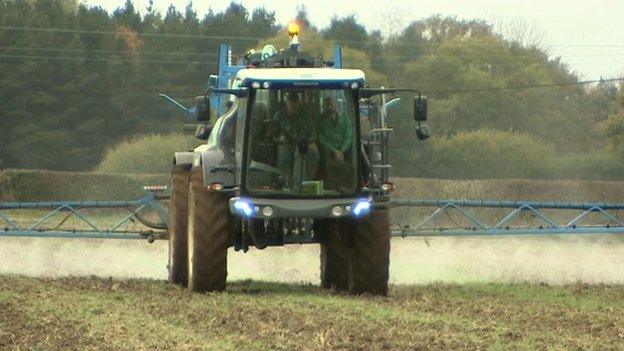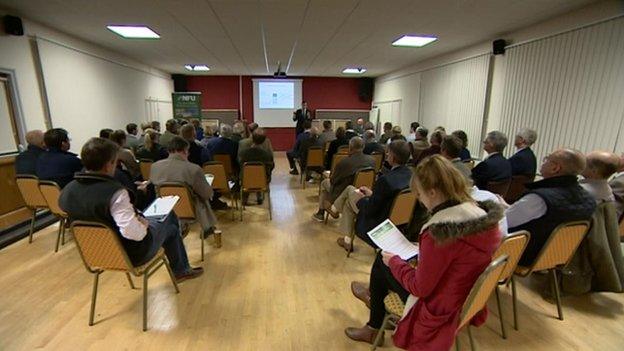Farm subsidies: does the CAP still fit for farmers?
- Published
- comments

It's hard to get on with your job without a clear idea of how the new Common Agricultural Policy will work
I do love a big pile of data and frankly they don't get bigger than farmsubsidy.org, external.
It's a website run by the European Fund for Investigative Journalism that allows you to search for cash paid out from the Common Agricultural Policy (CAP).
There are official tools to do the same thing (not least on the government's website, external) but funnily enough they're quite hard to use.
Farmsubsidies.org on the other hand is quick and simple and also much more forgiving when it comes to search terms and more general poking about.
So if you have a bit of a play you'll discover that the biggest single CAP payments in the Midlands haven't been for farming at all in the last few years.
Instead, they've been massive grants, about £3m (4 million euros, external) in 2012, for education and training.
A backwards step?
That's a sign of just how much farm subsidies have evolved.
In a post-war Europe the idea was to make sure people never went hungry again and farmers were paid for production.
We certainly never starved but we also had to deal with butter mountains and wine lakes - friends still remember massive blocks of EU butter being distributed to Asian families in Wolverhampton for turning into ghee.
These days farmers are no longer paid cash based on the amount they produce, that link has been broken. Instead, the CAP has been slowly moving towards a more market orientated approach with a thick layer of environmental concerns and training slapped on top.
Until the last round of reforms that is, which come into effect in May next year. I've heard them described by one expert from the NFU as a step sideways at best and perhaps even a step backwards.

I sat in on one National Farmers Union CAP "roadshow" in Gloucester
Apart from the usual worries about switching to a new computer system (something that went very badly wrong, external last time), there are new blanket instructions farmers must obey to get the full amount.
These are aimed at making farming "greener" but will also have the potential to make life much harder, particularly for smaller farms.
Does it work?
I sat in on one National Farmers Union (NFU) CAP "roadshow" at Gloucester Farmers Club as the new rules were explained to an attentive audience.
Even though the latest version of the CAP is due to begin in a few months' time, the government is still issuing guidelines about what to do and farmers certainly don't have the full picture yet.
In the meantime of course, farming carries on. But it's hard to get on with your job without a clear idea of how the new CAP will work, or even if the way you currently farm might incur some as yet unclear financial penalty.
So given all this upheaval does the CAP work?
Well, food is plentiful and affordable. The English landscape here in the Midlands is still that patchwork of fields free of bracken and scrub that we find so pretty to look at and, at a time of plunging commodity prices it's CAP cash that will keep many of our dairy and even arable farmers going this year.
The CAP still allows farmers to innovate and respond to the market and consumer demands.
Family farms or mega-dairies?
Certainly more so than non-EU countries like Switzerland where government farming subsidies (they're not just a European invention) have preserved in aspic a certain approach to the land.
At Gloucester Farmers Club I asked for a show of hands of how many farms wouldn't survive without subsidy and almost all the hands went up. But, one farmer then made it very clear that while subsidy may be vital "it doesn't mean we like it."
So, if we leave the EU and the CAP with it how would our farmers cope? It would be a huge change so how would that be managed? Would a UK government introduce its own subsidy scheme?
Would such a scheme aim to preserve a particular way of farming and the look of the countryside or instead equip our farmers to compete with the really big agricultural boys like Brazil and America? Would the support small Midlands family dairy farms or push for more "mega-dairies"?
For those that want us to leave the EU and CAP behind, these are big questions that need detailed answers.